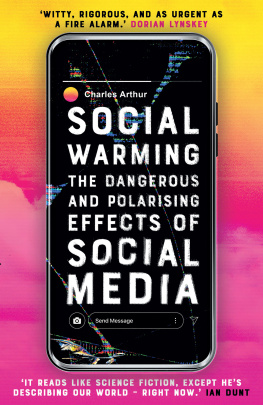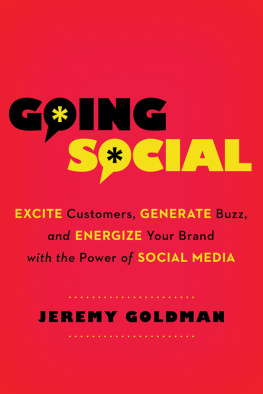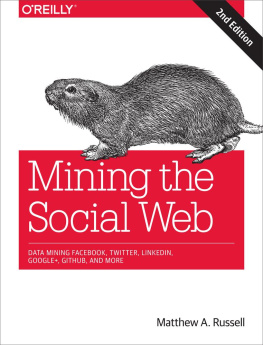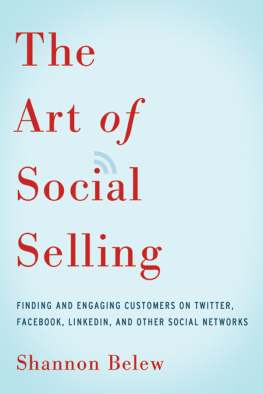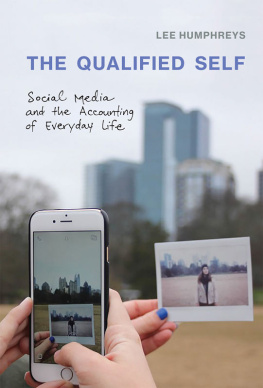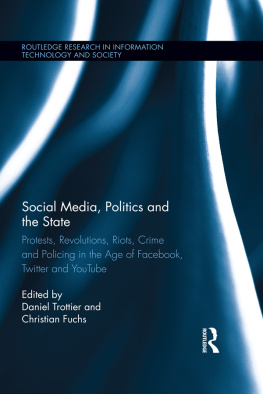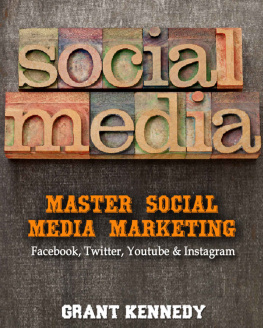About the Author

Charles Arthur is a journalist, author and speaker, writing on science and technology for over thirty years. He was technology editor of the Guardian from 20052014, and afterwards carried out research into social division at Cambridge University. He is the author of two specialist books, Digital Wars and Cyber Wars .
Acknowledgements
The first inklings of this idea came through the work I did at Cambridge Universitys Centre for Technology and Democracy in 2016, looking at the polarising effects of time spent online. Im grateful to Professor John Naughton, who gave me the opportunity there to begin the research which eventually became this book. Thanks too to my agent, Doug Young, who listened to the much more boring book topic that I pitched to him, looked at the ceiling for a bit and said, Do you have any other ideas? Which led me to offer this one as Plan B, which became Plan A.
Thank you to all the team at Oneworld, particularly my editor Cecilia Stein for her patient reading and excellent suggestions about changes, as well as Rida Vaquas, Juliana Pars, Margot Weale, Paul Nash and Jacqui Lewis, who checked names and corrected all the grammar which... that was wrong.
There are of course so many people who have helped and supported in so many ways. A special mention must go to Shian Powell for all the cakes, and Becky McGrath for making me work off the effects of the cakes.
A final word of gratitude must go to Jojo, for her enormous reserves of kindness, generosity and patience. I couldnt have done any of this without her.
Prologue : The Shape of the Problem
Nobody meant for this to happen. Everything was meant to get better, not worse.
In January 2007, Steve Jobs, Apples then chief executive, held aloft a little device in his hand. This is a revolution of the first order, to really bring the real internet to your phone, he announced. Until then, the internet had largely been confined to PCs; only a few million people had an internet-capable phone, and even they had limited capacity for viewing or interacting with online content.
Social networks were in their infancy. Facebook had twelve million users, having just opened up to the world beyond US university students the previous summer, about the same time as it had patented the software for a News Feed that would pick out the most interesting status updates from your friends. Twitter was less than a year old and had tens of thousands of users. YouTube had been bought two months earlier by Google for $1.65 billion a price seen as astonishing, despite the sites estimated 70 million monthly users.
Mark Zuckerberg, founder of Facebook, originally defined its purpose as To give people the power to share and make the world more open and connected. He tweaked that slightly a few years later, to give people the power to build community and bring the world closer together. The broad sweep was clear: to get people to communicate with each other more easily and directly.
In just over a decade, the world has gone from a time when barely anyone owned a smartphone to one where more than 4 billion of the worlds 7.6 billion do, and almost all of them connect to social networks. Walk today down a street past a construction site, past a coffee shop, past a parent pushing a pram, and youll see the same thing: people gazing down at their smartphones, flicking through screenfuls of posts, photos, videos and comments. Smartphones have replaced cigarettes as the perfect filler for those empty moments, waiting for trains, meals or a friend. Pull it out of your pocket, watch it light up, suck it in and relax.
Just as smokers can measure their cigarette consumption in packs, we can measure our social media consumption in screens: in 2017, a Facebook executive said the average person scrolls through 300 feet of social media feeds per day on their phone. Thats about 750 screens worth, consumed over an average of two hours per day.
Social media as a crutch may be akin to smoking something to do with our hands that also steadies our minds. But the cumulative effect is much more akin to global warming: pervasive, subtle, relentless and, most of all, caused by our own actions and inclinations.
That we use social media to fill our downtime is not a problem in itself; few would be reading War and Peace instead. But this use is closely monitored, the experience is individually tailored, and herein lies the harm.
Since social networks became widespread, Facebook has been implicated in a genocide, Twitter became the battleground for a misogynistic campaign leading to serious real-world threats and attacks, and YouTube has been accused of enabling the radicalisation first of Muslim jihadis and then of right-wing white men who would go on to kill. Women have received death and rape threats for campaigns about a banknote; football stars have been targeted for anonymous racist abuse from twelve-year-olds; and two men, who were brought together by an algorithm that spotted they were interested in the same topic, started communicating in a Facebook Group, and decided to act. The topic was causing a civil war, and the action was to kill a police officer.
These arent aberrations. Social networks have these results when used as intended, as designed. After all, youre supposed to connect with like-minded people.
The same pattern of events keeps happening when social networks are involved: small differences are amplified into bigger disagreements, and the people on either side of those positions are drawn towards extremes of belief or action. These networks are optimised to consume our attention, and powered by software that feeds on, and exploits, our inherent tendencies towards outrage and polarisation.
As long as social networks stick to their current design, events like these will keep happening, and get worse as the number of people using those networks increases. And in the next five years, another billion people will be able to access a smartphone.
Were living in an age of social warming a side effect, an unintended consequence of technological advance making our lives more convenient.
We call it warming because its gradual. Gradualism means we dont quite notice the point at which things shift for the worse.
Social change isnt marked by abrupt shifts, but by almost imperceptible changes in behaviour and habits that are only obvious in retrospect. To take a trivial example, films and photos from the 1940s show almost all men wearing formal hats outside (which they raise to passing women), and everyone seems to be smoking. Nowadays, men dont wear formal hats, and hardly anyone smokes. But there was never a single moment when men suddenly stopped wearing hats. Doing so just became less common as more people rode in cars, where a hat was an inconvenience, and as younger public figures such as John F. Kennedy, who never wore one, and the Beatles, who would never have dreamed of it, came to prominence. (Nor has the male need for a head covering in cold weather gone away. The formal hat industry mutated into the baseball cap and beanie industry.) Social warming arises from the desire to have a computer, the smartphone, thats allied with our hunger for information and desire to connect with more and more people. Its effects have only become noticeable as the adoption and power of social networks and smartphones has grown large enough to begin shifting our behaviour significantly.
Social warming happens when interactions between people who used to be geographically separated and infrequently exposed to each others views are more frequently brought together, and kept in orbit around topics that will engage them and create addictive experiences.
Next page
